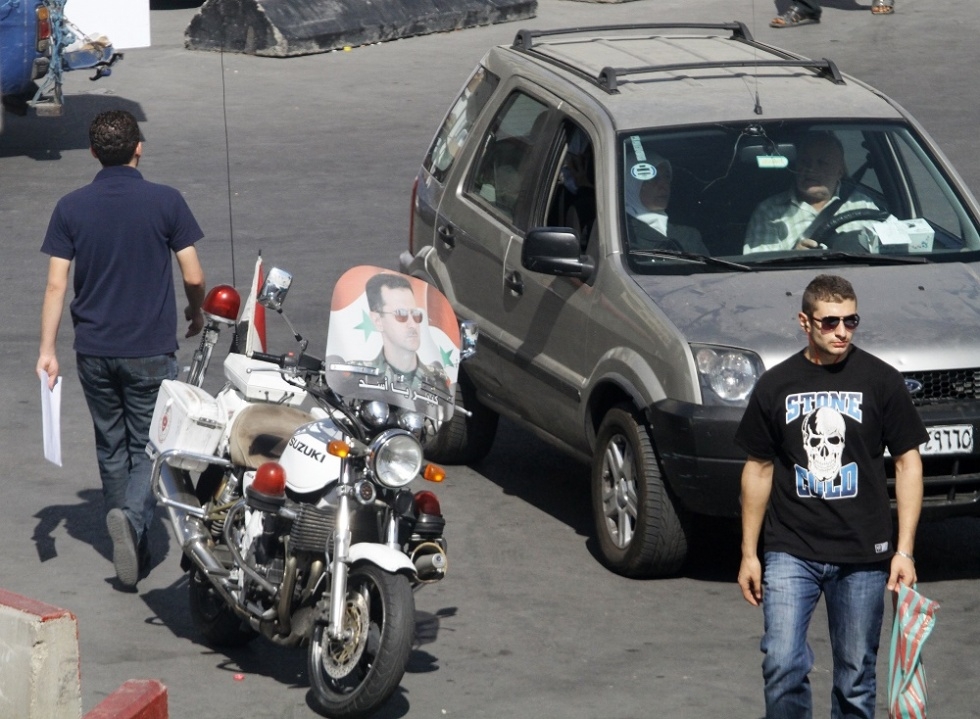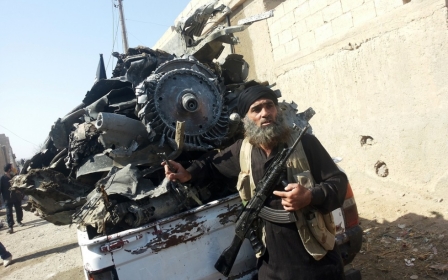Syrians react to the US-led anti-IS strikes

DAMASCUS: Syrians in the capital Damascus reacted with a mixture of support and scepticism about the US airstrikes on Islamic State (IS) that began in Syria overnight.
While many expressed relief that the US would now begin an “ongoing” campaign against the militant group that has seized swathes of Syria and Iraq, they also felt weary about the prospect of the aerial bombardment ending the more than three-year-long war.
There was likewise a strong feeling that Washington should work with the Syrian government if it were really serious about defeating the militant group.
"If they do it with our government's cooperation we agree with it but it won't end the war", said Marie, a social worker and a Christian who was walking with a friend in central Damascus.
"The problem is not only Da'ish [the Arab acronym for IS]. If they keep sending money and help to all the extremists - the war will go on."
Since the uprising against Syrian President Bashar al-Assad first broke out in early 2011, at least 190,000 people have been killed and millions more displaced, according to the UN.
"America created Da'ish, but can no longer control it," said Ramzi Nasri, a customer in a nearby shop selling gifts.
"We don't reject the US airstrikes on Da'ish as long as we're not also going to be hurt. How can they re-assure us without coordinating with us? What we worry about is that they will also attack the Syrian army, and that will delight Israel."
Syrian state television is reporting that US Secretary of State John Kerry sent a letter informing the Syrian authorities about the strikes.
"The foreign minister received a letter from his American counterpart via the Iraqi foreign minister, in which he informed him that the United States and some of its allies would target [IS] in Syria," the foreign ministry said in a statement.
"That was hours before the raids started."
The US State Department however denied these reports saying the United States did not give the Syrian government any advance warning of the air strikes launched against Islamic militants early Tuesday.
"We did not request the regime's permission. We did not coordinate our actions with the Syrian government. We did not provide advance notification to the Syrians at a military level, or give any indication of our timing on specific targets," State Department spokeswoman Jen Psaki said in a statement.
An earlier statement by the Foreign Ministry also said that the US had told Bashar al-Jaaferi, Syria's ambassador at the UN, that Islamic State would be struck in the Raqqa province.
However, the US has not confirmed this, instead saying that there has been no direct cooperation with the Syrian government.
In an apparent bid to remind Washington that it is also fighting what it calls terrorists, Syrian fighter-bombers continued to strike targets in eastern Damascus yesterday.
Planes streaked across a cloudless sky, as they have done repeatedly in recent weeks, sending up clouds of dust as their munitions hit the ground in the outlying suburbs of Joubar and Dukhania.
Later on Tuesday, after Syrian State TV had featured frontlines reports from various parts of the country with pictures of tanks and aircraft in action and relied entirely on written statements put out by the Syrian Foreign Ministry, President Bashar al-Assad appeared on the channel with Iraqi National Security Advisor Faleh Fayyad.
Fayyad reportedly briefed Assad on Iraq's efforts to battle IS militants while Assad said "that Russia is proceeding resolutely in its war against all forms of takfiri terrorism which it has been waging for years, asserting that Syria supports any international counterterrorism effort," according to the state-run Syrian Arab News Agency (SANA).
In a mobile shop, Abu Rahin, a sales assistant, was enthusiastic about the US-led strikes which are supported by five Arab countries – Saudi Arabia, the UAE, Bahrain, Jordan and Qatar.
"This means America will become friends with the Syrian government. I believe this is the beginning of the end of the war. The world cannot fight Da'ish without agreeing with our government because Syria is the only force capable of defeating Da'ish," he said.
Mohammed Helaleh is a pensioner who worked for USAID until the American organisation pulled out of Syria in 1984. He later worked in the Canadian embassy as an accountant but explains that he feels very worried about the US-led strikes.
"How can they send missiles from the sea and really hit an exact people. Ordinary people will be hit. It's very simple. They should come to Damascus and arrange things with the Syrian government. We have experience after fighting terrorists for three years."
Helaleh was also convinced the United States and its friends in Saudi Arabia and the Gulf had helped bring the militants to Syria in the first place.
"It's a bad joke," he said. "The people who were supporting terrorists are now fighting them. It's unbelievable."
Mohammed Nadi who owns a shop selling men's shirts said it was not enough for the US to inform the Syrian government. "They should co-operate together,” he insisted. But he added that he didn't believe in air strikes as the right tactic to defeat ISIS. "They come through Jordan and Turkey and Western countries help them with money and weapons. Today, they are killing them in Syria but more of them will just come over the borders.”
Ruba, a 22-year-old waitress in a city centre cafe, who is from the Druze minority, said she was worried about Da'ish. But she said the "air strikes were bad. They should leave it to Syrians to handle this.”
According to the Syrian Observatory for Human Rights, a UK-based observatory, more than 20 IS fighters were killed in the strikes, in addition to militants from the al-Nusra Front and Khorasan Group. Eight civilians, including children, were also killed, the watchdog said.
However, the figure could be higher with local residents in Raqqa reporting that tens of civilians, including at least three children, were killed this morning by the US-led airstrikes.
"Our party colleagues in Raqqa have told us there were many casualties," Elia Samman, a member of the central political bureau of the Syrian Social National Party, an opposition party, told MEE . "Around twenty civilians were killed, including three children which is unacceptable. We are waiting for more information as the day goes on."
Samman added that it would be better if the US had co-ordinated with the Syrian government in a better way. "I hope they don't use the scenario as a cover to attack the Syrian army." He also expressed concern that the attacks might be counterproductive. "ISIS will get support in certain areas as victims."
Officially, the reaction from the Syrian government has been cautious and muted, with the authorities saying that they support “any international effort” to fight terrorists like IS.
US-led airstrikes killed at least 120 militants in Syria on Tuesday, the Syrian Observatory for Human rights said.
The dead included more than 70 members of the Islamic State (IS) group in the north and east of Syria, as well as 50 Al-Qaeda militants, according to the Britain-based monitoring group.
New MEE newsletter: Jerusalem Dispatch
Sign up to get the latest insights and analysis on Israel-Palestine, alongside Turkey Unpacked and other MEE newsletters
Middle East Eye delivers independent and unrivalled coverage and analysis of the Middle East, North Africa and beyond. To learn more about republishing this content and the associated fees, please fill out this form. More about MEE can be found here.



